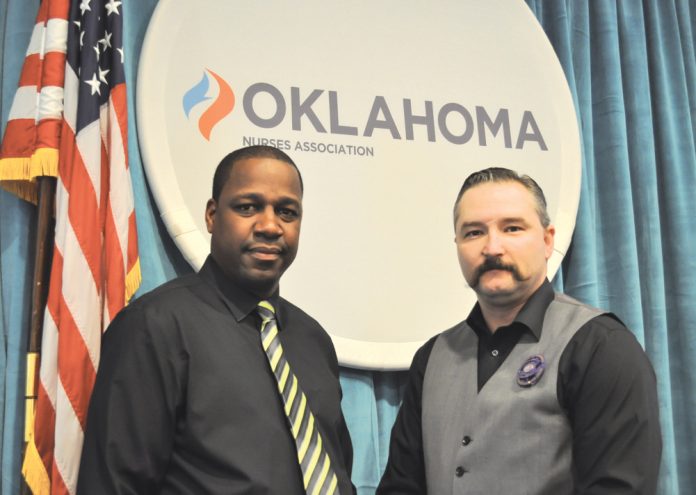
by Bobby Anderson, RN, Staff Writer
With 18 years in law enforcement, Cleveland County Sheriff’s Office Captain Ronnie Johnson has seen his fair share of domestic abuse cases.
As the Public Safety Specialist for Integris Health, Lt. Dee Dee Carter sees violence spill over into the hospital on a daily basis.
Each law enforcement officer says all too often nurses are caught in the middle of both situations.
“I’ve seen it my entire career,” Johnson said of abuse. “My first arrest in law enforcement was a domestic assault with a dangerous weapon. I didn’t recognize at the time that was going to be my niche, what drove me and what I really wanted to push for and push out of the community.”
“The way society is it’s going to take an entire community to say that’s not acceptable.”
Law enforcements, administrators and fellow nurses discussed the topic at the recent Oklahoma Nurses Association Annual Convention titled Empowering Nurses: Inspire. Innovate. Influence.
Nationally, 1 in 4 nurses have experienced some kind of workplace violence. The convention helped highlight the American Nurses Association’s initiative of ending violence against nurses in the workplace.
Johnson and Carter hit on both ends of the spectrum where nurses may experience abuse: at home and at work.
Speaking to an audience of largely women, Johnson shared ways people can find themselves trapped in domestic situations.
He highlighted a case where an abuser sent his partner to the store with a check to pay for goods or services knowing the check would bounce.
Once the check bounces merchants typically turn that person into the attorney general’s office for collection proceedings.
This generates a warrant for the check writer’s arrest until paid.
If the person experiencing abuse gets to the point where they threaten to call law enforcement then the situation is used against them with the threat of possibly losing their children.
“Would you second guess calling them if you knew your kids were going to be taken away?” Johnson said. “True or not but just the threat of that possibility (is enough).”
Abuse is often about control and may not manifest outwardly until later.
Whenever controlling tactics start not to work is when you see the physical and sexual violence and the battering stage, Johnson said.
“This could be a patient, a family member or coworker – talk to them,” Johnson said. “You need to say these things sincerely.”
Johnson recommends ways to approach including:
* I am afraid for your safety
* I am afraid for the safety of your children
* It will only get worse
* I am here for you when you are ready to leave
* You do not deserve to be abused.
* It’s not your fault.
At work, Carter says violence towards nurses is a constant concern.
“Self awareness is the biggest one and observing the environment before you go in and initiate care,” Carter said of ways nurses can be on guard. “(Nurses) are overworked so they are hasty to go into a room whether it’s altered mental status or a brain bleed or just a leg wound. They’ll go in and start their initial assessment without even seeing what (the patient’s) affect is.” The idea that some violence is just part of the job and nurses should be OK with that irks Carter, whose wife is a mental health nurse.
“I don’t care if its altered mental status, dementia or anything like that if you’re assaulted that’s assault,” Carter said. “Regardless, I’ll let the police make that decision or let a judge make that decision. We encourage our people ‘hey, you press charges, you got assaulted.’ You don’t have to be subjected to unruliness.”
“Once they’re medically cleared, that’s a felony charge and they can go to jail.”
Carter estimates that safety officers are not called soon enough in up to one-third of all calls. And some of that comes down to nurses believing they can or should deal with the situation.
“I have a gun and taser on my hip but if I’m going to go deal with that patient I’m going to call for backup so why would you go in and deal with that patient alone?” Carter said. “With my wife being a nurse that infuriates me.”
Johnson also advises nurses to never be in a room alone when dealing with patients withdrawing.
“They’re addicts for a reason,” Johnson said. “We have drugs and syringes. You have an alcohol patient that’s having the same withdrawal symptoms as someone on meth.”
“These people don’t want Norco, they want Jim Beam and vodka and you’re keeping them from getting their drug of choice and that puts you in a hostile situation.”

Join Our TEAM Today
$5,000 SIGN ON BONUS FOR FULL-TIME POSITION
We are hiring RNs for
Medical-Surgical – RNs
Emergency – RNs
Applicants should apply at
www.alliancehealthseminole.com












